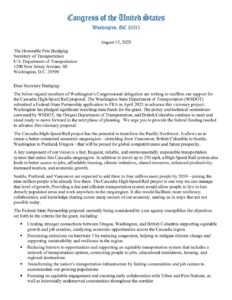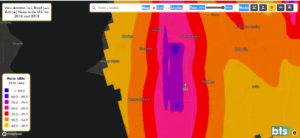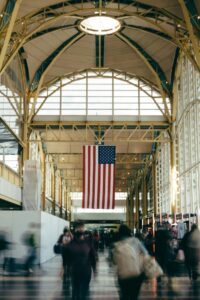In October, I wrote about Alaska Airlines, American Airlines, Delta Air Lines, Southwest Airlines, and United Airlines tentatively being awarded beyond-perimeter slots at Ronald Reagan Washington National Airport (DCA). For context, the Federal Aviation Administration (FAA) approved a bill that will allow five beyond-perimeter slots to be added. Each accommodate a flight that breaches the past 1,250-mile limitation
Mission Critical?
A proposal to fund a West Coast Bullet Train should be viewed only with cautious optimism by airport communities. When this Washington Democratic Delegation proposal for funding a West Coast Bullet Train showed up, I immediately thought of how unreliable it has been to take AmTrak to Vancouver, BC over the past three decades. But
Washington State Congressional Delegation letter in support of Cascadia High Speed Rail proposal 08-15-2023

2018 Department of Transportation Noise Map near Sea-Tac Airport

Highway Foes Emboldened as Buttigieg Puts Houston Project on Pause
After the U.S. Department of Transportation asked the Texas DOT to halt a highway expansion, freeway fighters nationwide are calling on Secretary Pete Buttigieg for similar aid. By Laura Bliss Traffic backs up along the Massachusetts Turnpike in the Allston neighborhood of Boston in 2017, where foes of an aging viaduct are hoping for federal
Aviation Economic Impact Calculator
Welcome to the WSDOT Aviation Economic Impact Calculator. This tool is designed to assist users in estimating an airport’s change in regional economic impacts based on potential changes in activity at the airport. The calculations in this tool are high-level estimates designed to give a sense of magnitude of economic impacts, but are not to
Washington Aviation System Plan 2017 (WASP)
*2020 Update* WSDOT Aviation, with the assistance of consulting firm Kimley-Horn, has completed a new statewide Aviation Economic Impact Study for the Washington Aviation System. The study revealed the state’s 134 public-use airport system contributes 407,042 jobs, $26.8 billion in labor income, and $107 billion in total economic impact (business revenues) to our state’s economy and communities.
City of Burbank v. Lockheed Air Terminal
In one of the most maddening examples of airport law, the United States argued for reversal (ie. allowing for local airport control) of curfews. The FAA, which had previously supported the ban, adopted a neutral position when the The Department of Transportation, filed a Friend of the Court brief arguing for reversal. Summary Holding that
